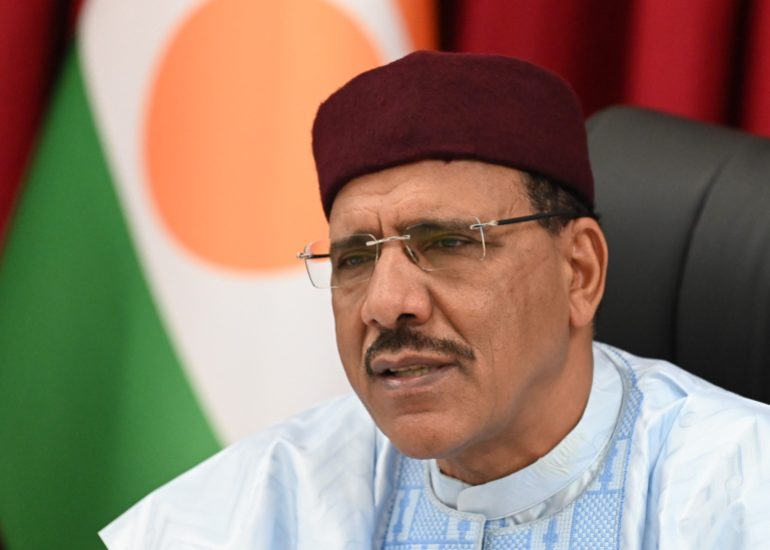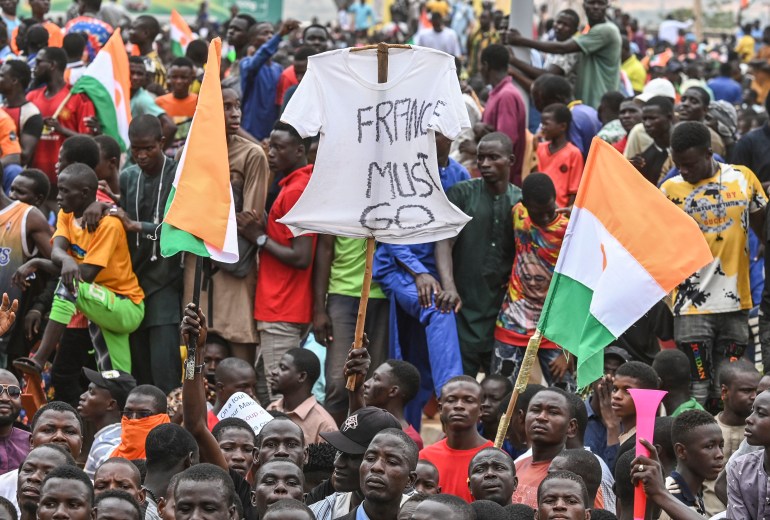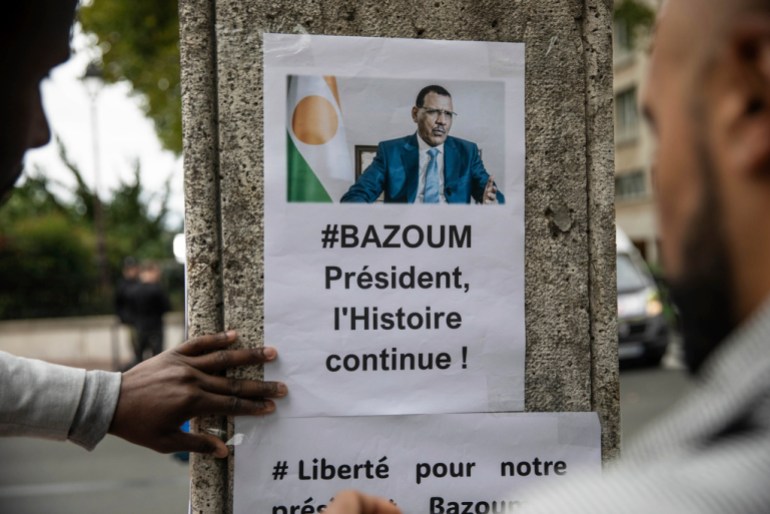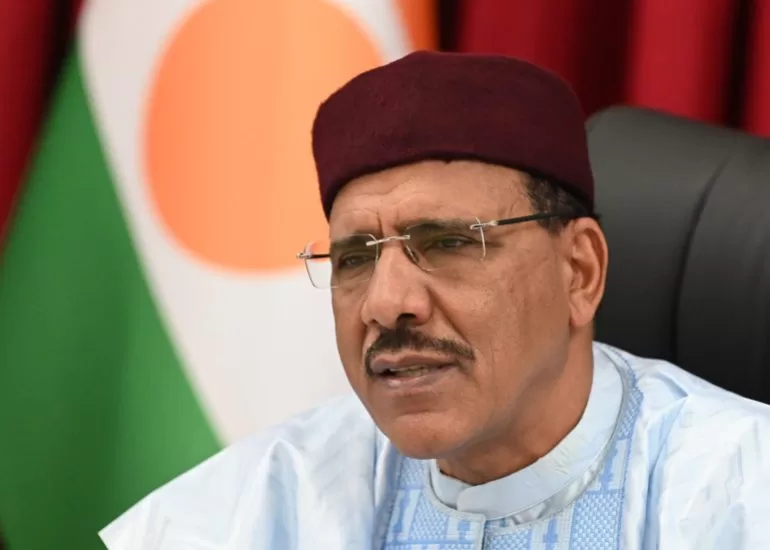Niamey, Niger – “No talk of politics today,” Aissata* said to her teenage daughter on the way to her parents’ house for their traditional Sunday gathering in Niamey.
“We can’t talk about any of this with the others. I don’t want any tension at the table.”
The 60-year-old mother of four and former teacher returned to Niger with her family five years ago after spending most of her adult life in the United States. She and her husband decided to retire to their homeland when their youngest daughter left home for college.
Since the July 26, 2023 coup against Mohamed Bazoum – a democratically elected leader and close ally to the European Union who ruled for a mere two years before being forced out of office – Aissata has welcomed the military government and new President, Abdourahamane Tchiani.
“I think some people misjudge Tchiani for being part of the former establishment that he’s condemning today. But as the former head of the presidential guard, he isn’t responsible for the previous governments’ shortcomings,” she told Al Jazeera.
“Tchiani is saying he’ll rid us of our old system and prioritise Niger and Nigeriens. That’s what we need, more than anything.”
Aissata, much like many of her fellow Nigeriens, has subscribed to the revived notion of “Labou Sani no” in Zarma and “Zentchen Kassa” in Hausa, two of the country’s main Indigenous languages.
Etymologically rooted in the idea of the “country of the fathers”, this concept calls for an unwavering commitment to the nation, even to the point of self-sacrifice. It is a call for unity and loyalty to the homeland, transcending all other identities and loyalties.

Since declaring himself head of state after the military seized power from Bazoum, the former head of the presidential guard Tchiani, and his new government, have rallied the population to prioritise the nation’s needs, above all else, in a time of strife.
In the aftermath of the coup, regional bloc the Economic Community of West African States (ECOWAS) slapped a battery of economic sanctions on Niger.
More than six months later, in February, the bloc revised its strategy and opted for a gesture of appeasement towards the military government by “lifting with immediate effect” the closure of land and air borders, lifting the suspension of all economic transactions between ECOWAS countries and Niamey, as well as the freeze on assets held by the Nigerien state in commercial and central banks.
But the socioeconomic damage had already been done.
‘Struggling’
According to the Nigerien National Institute of Statistics (INS), between the end of July and the end of August 2023, the cost of some of the country’s staple foods significantly rose; the price of rice and sorghum increased by more than 16 percent, followed by wheat and maize (12 percent), millet (6.4 percent), and meat (5.2 percent). The Sahelian country moreover faced electricity shortages as Nigeria, which provides 70 percent of Niger’s electricity, cut off power supply to the country in accordance with ECOWAS sanctions.
Similarly, a $400m deal to start exporting crude oil to China via a 2,000km (1,243-mile) long pipeline linking Niger’s Agadem oilfield to Benin’s port was delayed and jeopardised. Even after the bloc’s sanctions were lifted, Benin’s compliance with the land border closure paved the way for an ongoing feud between the two countries.
Part of the general public resented ECOWAS along with its Western allies for what they considered a condemnation of the Nigerien people alongside their de facto leaders.
In October 2023, EU foreign ministers decided to draft sanctions against Nigerien military leaders, aligning with measures taken by ECOWAS. Although they included humanitarian exemptions to alleviate the impact on the civilian population, the average Nigerien perceived this move as a way of emboldening ECOWAS, at the expense of their their lives.
“You couldn’t get your hands on medicine at the pharmacies. We had to have everything brought to us from abroad by friends and connections,” Aissata explained.
“But most Nigeriens didn’t have these connections. People were struggling to survive. They still are to this day. I blame ECOWAS and the European nations who have supported them.”
Niamey’s habitual laid-back atmosphere appears to have given way to a certain weariness in the face of growing hardship. But Nigeriens are not new to strife. The World Food Programme reported that even before the coup, 3.3 million Nigeriens were already facing severe food insecurity.

Upon assuming power, the military pledged to put an end to what they labelled the “exploitation of Niger’s natural resources by foreign powers”. Since then, the rift between Niger and France, its former colonial power, has deepened.
The last French soldiers left the country at the end of 2023, and France closed its embassy in Niamey. On June 20, Niger announced that it had revoked the operating licence of a major uranium deposit from the French company Orano, following through on an ultimatum given to the company.
A few years ago, protests started erupting across the Sahel region demanding the withdrawal of French troops involved in the counterinsurgency Operation Barkhane in Mali. Notably, at the end of November 2021, a Barkhane military convoy was blocked and pelted with stones in Burkina Faso and later in Niger. These forces were criticised for their perceived ineffectiveness and even accused of collusion with armed groups.
“We are witnessing the political instrumentalisation of hostility towards certain aspects of the colonial legacy, such as the CFA franc and military cooperation. This creates a fertile ground for authorities who lack legal legitimacy and are seeking popular legitimacy,” explained Amadou Sadjo Barry, a researcher in international relations ethics and a philosophy professor in Quebec in an interview with Le Monde in the aftermath of the coup.
After being expelled from Mali, France stationed about 3,000 soldiers in the Sahel, with a significant presence in Niger, one of its key regional allies. Bazoum’s assumed closeness with France eventually backfired in a context of growing resentment towards the former colonial empire.
‘Pro-junta or pro-Bazoum’
One year after the military coup, the nation seems deeply divided.
“You are either pro-junta, or pro-Bazoum,” said Fatima*, Aissata’s older sister.
A former public servant whose husband worked in government, she lost her job in the aftermath of the coup.
“They are just out for blood. There’s been a witch-hunt in Niger since they came to power. They’re not interested in forging a new and improved country or in governing the country. They want to take people down and accumulate wealth and power,” she said about the military leaders.
Referring to the new government’s notion that it intends to put Niger and Nigeriens first, Fatima argued: “Their official discourse is just propaganda and divisive rhetoric.”

Aissata and her sister’s relationship has been strained for several months. They can never discuss politics without it turning into an explosive fight. They’ve chosen to avoid the subject, and at times each other, altogether.
“I can’t trust someone – not even my sister – if she thinks it’s OK for the former president and his family to be treated the way they’ve been treated … deprived of their freedom, rights and dignity,” Fatima added.
Bazoum was overthrown in what international observers labelled an exemplary democratic transition. He was immediately locked away by the coup plotters. For nearly a year, the deposed president has been confined in his residence with his wife and son. He has steadfastly refused to sign a resignation letter.
In a pivotal decision on June 15, Niger’s State Court stripped Bazoum of his immunity. This development has set the stage for the former president to face charges of alleged high treason. Bazoum’s lead attorney, Moussa Coulibaly, lambasted the ruling, calling it a blatant denial of independent justice in Niger.
Amnesty International also condemned the decision, labelling it a violation of procedural norms and the rights of defence.
Moreover, the National Council for the Safeguard of the Homeland (CNSP), also known as the transitional government, has frozen the accounts of numerous relatives, supporters and former collaborators of the overthrown president in Niger.
A series of coups
The 2023 coup in Niger did not come as a surprise.
Since gaining independence in 1960, governments in the landlocked West African state have been overthrown four times, amidst numerous other attempts that have punctuated its political history.
In recent years, the Sahel region has been marred with instability; a series of coups d’etat that have challenged the existing security alliances designed to push back against a longstanding transnational “terrorist” aggression.
On December 2, 2023, Burkina Faso and Niger announced their withdrawal from the G5 Sahel and its joint force, following Mali’s exit in 2022. Four days later, Mauritania and Chad, the remaining members, declared the upcoming dissolution of the G5 Sahel. The association created in 2014 was designed to bring together West African countries grappling with the proliferation of “terrorism” factions and organised crime. The plan was to fight against all forms of insecurity in a holistic way, mixing the military and development approaches together.

Niger is now engaged in a different strategic alliance. As part of the Alliance of Sahel States (AES), composed of military-run Niger, Mali and Burkina Faso, the three governments have also signed a defence pact focused on the fight against “terrorism”.
Although the military government doesn’t openly disclose how the country’s army has been handling the fight, the nation has just suffered a murderous attack. Twenty soldiers and one civilian were killed on June 25, in an attack in the Tera region, in the west of the country.
Aissata found out about the attack on Facebook. “It’s a tragedy. But I wholeheartedly believe that we’re in this dire situation because of prior governments and their laxity. We need a change in our strategy. We also need to give our leaders the time to succeed.”
In one of Niamey’s main markets, vendors and consumers aren’t willing to comment on the security situation or governance under the military.
“You can ask me again in a few years when tension hopefully does not run as high,” says Abdoulaye, a vegetable seller.
“One thing I will say is that I know people who go to rallies and are so sure of what the government is doing and that Tchiani will solve all of their issues. I know I don’t believe he will.
“It was hard for us to make do when Bazoum was in power. It is hard now. We can’t trust any of these leaders. Only God can save us.”
*Names changed to protect privacy.
